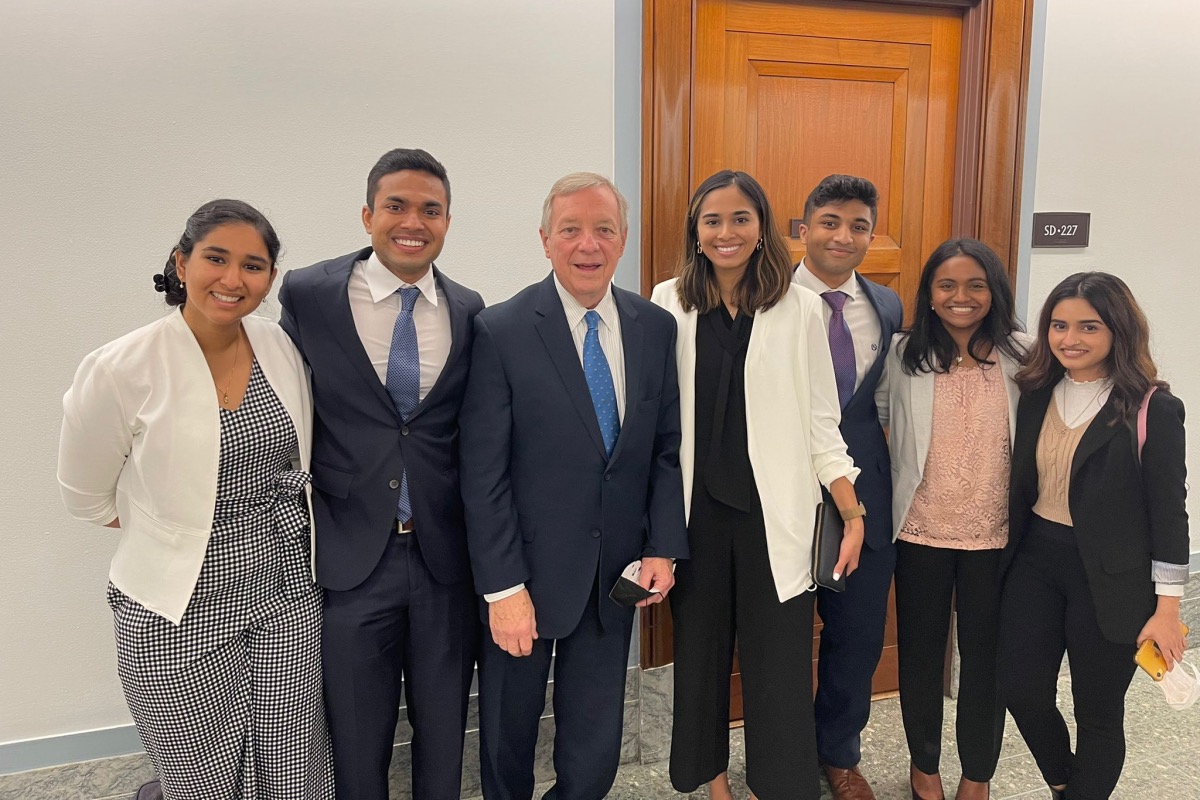

Sen. Dick Durbin (D-IL) meets with members of Improve the Dream, a group that advocates for young immigrants, November 3, 2021. (Improve the Dream/Twitter)
WASHINGTON, D.C. — Senate Majority Whip Dick Durbin (D-IL) told Latino Rebels on Wednesday afternoon that Green Card reform provisions in the House version of the Build Back Better Act might be submitted for Parliamentarian review.
“I assume they will,” said Durbin. “But we’ve gotta see what comes over from the House and then go through both the Parliamentarian’s exercise under the Byrd Bath and the privileged scrub, whatever the hell that is.”
NEWS: Just asked @SenatorDurbin about meeting with @ImproveTheDream and whether green card relief provisions in the House text (60002-5) will be sent for parliamentarian review.
?"I assume they will," said Durbin, "but we've gotta see what comes over from the House…" (1/3) https://t.co/eI6MPwyYmt
— Pablo Manríquez ???? (@PabloReports) November 3, 2021
Privileged scrub, according to a Senate aide involved in the Democrats’ immigrant relief negotiations, is “wonky lingo that just means [Senate Parliamentarian Elizabeth MacDonough] looks at the bill as a whole to make sure it complies with reconciliation rules.”
MacDonough, an unelected Capitol Hill staffer tasked with issuing guidance on whether provisions proposed for budget reconciliation bills comply with Senate rules, advised against including the first two Durbin-led proposals for immigrant relief in the Build Back Better Act, President Biden’s mantlepiece social spending bill.
Durbin’s remarks came hours after meeting with Improve the Dream, an organization advocating for immigrant youth who grow up as dependents of long-term visa holders but then lose their legal status in the United States when they turn 21 years old.
“We thanked Sen. Durbin for his efforts to protect all immigrants in any way possible. Also for his co-sponsorship of the bipartisan bill to protect children from aging out (America’s Children Act),” said Dip Patel, 25, founder of Improve the Dream.
Sen. Durbin is also one of the original sponsors of the DREAM Act, which would permanently protect undocumented immigrants who were brought to the United States as children.
“I first heard about the DREAM Act when I was in high school and was disappointed when it failed in 2010. But I later learned I wouldn’t even qualify due to the requirement of being undocumented,” says Patel, who was born in India, migrated to the United States when he was four years old, and now works as a pharmacist in the Chicago area.
An estimated 255,000 immigrant youth in the U.S. are awaiting employment-based Green Cards, and another 100,000 will lose their chance to become citizens through their parents’ employment-based petitions when they turn 21, according to research by the Cato Institute.
“I’m glad that this issue is finally receiving the recognition that it deserves,” said Patel in a phone interview with Latino Rebels in the summer. “But I also hope we see action soon that delivers relief.”
“What I know of India is purely from trips to see my grandparents,” said Pareen Mhatre, another Green Card relief advocate who met with Durbin on Wednesday, in an interview with ABC News. “Everything I know is American. It just doesn’t make sense for me to go back to a country I’ve lived in for four months.”
“Everything I know is American." — Pareen Mhatre
An estimated 200,000 young immigrants living legally in the U.S. as dependents of their parents on temporary work visas are aging out of the program into a precarious legal limbo.@devindwyer reports. https://t.co/xUIMIIBwpr pic.twitter.com/HG03GQ00dP
— ABC News Live (@ABCNewsLive) October 5, 2021
Indian Americans make up the bulk of immigrants stuck in lengthy backlogs due to country-based Green Card caps. Backlogged immigrants legally living in the United States were conspicuously absent from the Democrats’ first pitches to the Senate Parliamentarian for immigrant relief.
A third relief proposal that also excludes immigrants in Green Card backlogs has been a source of confusion this week in the Senate. As of Wednesday morning, the third proposal (“Plan C”) to establish an immigrant parole program had still not been submitted to MacDonough for review.
***
Pablo Manríquez is the Washington correspondent for Latino Rebels. Twitter: @PabloReports


